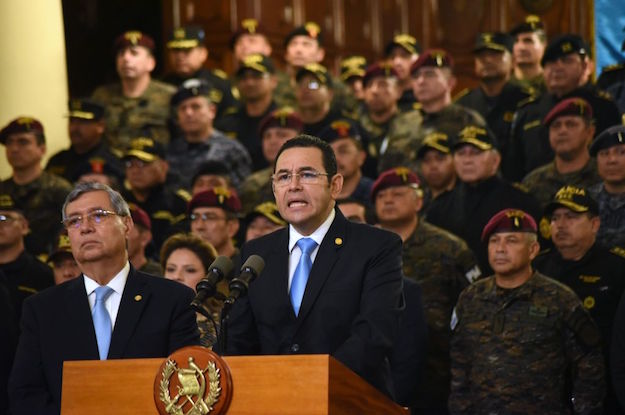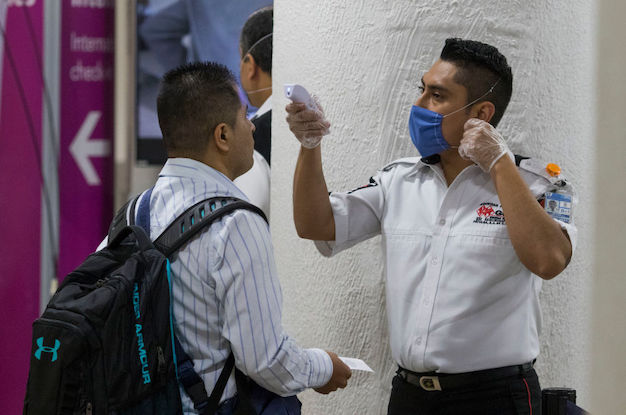Correction appended below
The urgent WhatsApp message went out Tuesday afternoon to members of #JusticiaYa, the group of students and activists that formed in 2015 to protest corruption in Guatemalan politics.
“Jimmy Morales wants to follow in the footsteps of Daniel Ortega,” read the first line.
It was an alarming comparison. Whereas Nicaraguan President Daniel Ortega had gradually chipped away at democracy before the country erupted into violence this year, Guatemala has been an international success story of institutions providing a check on power and holding elites accountable.
But events yesterday suggested that reputation may be in jeopardy, and stoked fears that the country’s separation of powers may be under attack – a scenario some Guatemalans worry could send them down a path to Ortega-style authoritarianism.
Four days after Morales announced he would allow the mandate of the UN-backed International Commission against Impunity in Guatemala (CICIG) to expire in 2019, a letter leaked Tuesday that detailed the president’s orders to bar Iván Velásquez, CICIG’s Colombian commissioner, from re-entering the country. (He is currently traveling in the U.S.) CICIG was critical to putting former President Otto Pérez Molina behind bars, and its investigations into Morales’ campaign financing have threatened the current president with a similar fate. In a statement, the government said the UN hadn’t cooperated with Morales’ requests to name a new commissioner, and had little choice but to expel Velásquez, who it called “a person who attacks order and public security.”
Morales tried to expel Velásquez last year, but Guatemala’s Constitutional Court overruled him on grounds that the Guatemalan Constitution prohibits that kind of unilateral decision. Furthermore, the court said, making him a persona non grata violated Guatemala’s founding agreement with CICIG, and Article 149 of the constitution requires the government to uphold international treaties.
That’s why Morales’ move Tuesday was “completely unconstitutional,” according to Carlos Arturo Villagrán, an expert on Guatemalan constitutional law and Ph.D. candidate at Melbourne Law School in Australia.
Villagrán told AQ that Morales’ action could land him in contempt of the court, leading to a new impeachment process.
But Congress may have other plans. On Tuesday, Morales’ allies in the legislature gave first approval to a set of reforms that would change the procedure for removing the immunity of – and ultimately impeaching – the country’s highest authorities, including the president and members of the Constitutional Court.
If passed, the law would eliminate a preliminary step that allows Guatemala’s Supreme Court (which is different from the Constitutional Court, which rules on constitutional issues) to throw out potential impeachment cases before Congress takes them up, acting as a check on accusations it considers political in nature.
The reform’s congressional backers call it a necessary step to ensure bureaucracy doesn’t keep cases against judges stalled, and to give legislators a right they say is constitutionally theirs. Critics of the reform, which is not a new proposal, say it would put pressure on the judiciary to bend toward the will of Congress, and could let Congress sacks judges it doesn’t like, said Villagrán.
“It would compromise democracy itself by eliminating some of these accountability procedures,” Villagrán said. “Ultimately they could leave the court vacant. In Guatemala, a vacant court would unleash chaos.”
That’s because the Constitutional Court in Guatemala has historically acted as a vital check on a strong executive branch. Its five justices are appointed separately, allowing competition that gives the court some independence. The president, Congress, and the Supreme Court each appoint a justice, as do Guatemala’s College of Attorneys and the country’s largest university.
The debate of these reforms came two days after Otto Rolando Gómez García, a lawyer and critic of CICIG, submitted a request to begin legal proceedings against three members of the Constitutional Court, as well as against Guatemala’s human rights ombudsman, Jordán Rodas.
“They’re trying to strike a blow to the courts, but also to fire Rodas, who has been instrumental in stopping the president’s attempts to oust CICIG,” Luis Barrueto, a journalist and activist, told AQ.
A group of lawyers, academics, and activists, including Rodas, has called on the Constitutional Court to reaffirm its decision last year that Morales can’t keep Velásquez from entering the country. If they do, and Morales does not back down, Guatemala would confront a constitutional crisis.
Meanwhile, Morales has increasingly described CICIG and Velásquez’s departure as a matter of public security, aligning himself with the military.
When Morales, flanked by generals, announced CICIG’s expulsion last Friday, he vowed he would defy “illegal orders,” which his critics saw as a pre-emptive warning to the courts. When military jeeps surrounded CICIG’s headquarters earlier that day, Insight Crime wrote that “few with any knowledge of Guatemala’s tormented history of military coups and counter-coups doubted the message.”
Presidents of Guatemala can serve only a single term, and the frontrunner for next June’s election so far is Thelma Aldana, the former attorney general who led investigations into the alleged corruption by Morales and members of his family. What happens in the coming year, however, may have more to do with the armed forces than with Morales or Aldana.
“Morales’ fate is now linked to the army,” Villagrán told AQ, suggesting it could protect him from legal threats. “It threatens democracy because you don’t know what the army will do to preserve Morales, before or after he steps down.”
A previous version of this article stated that the Supreme Court is subservient to the Constitutional Court. It is only subservient to the Constitutional Court on constitutional issues.
—
O’Boyle is a senior editor for AQ








